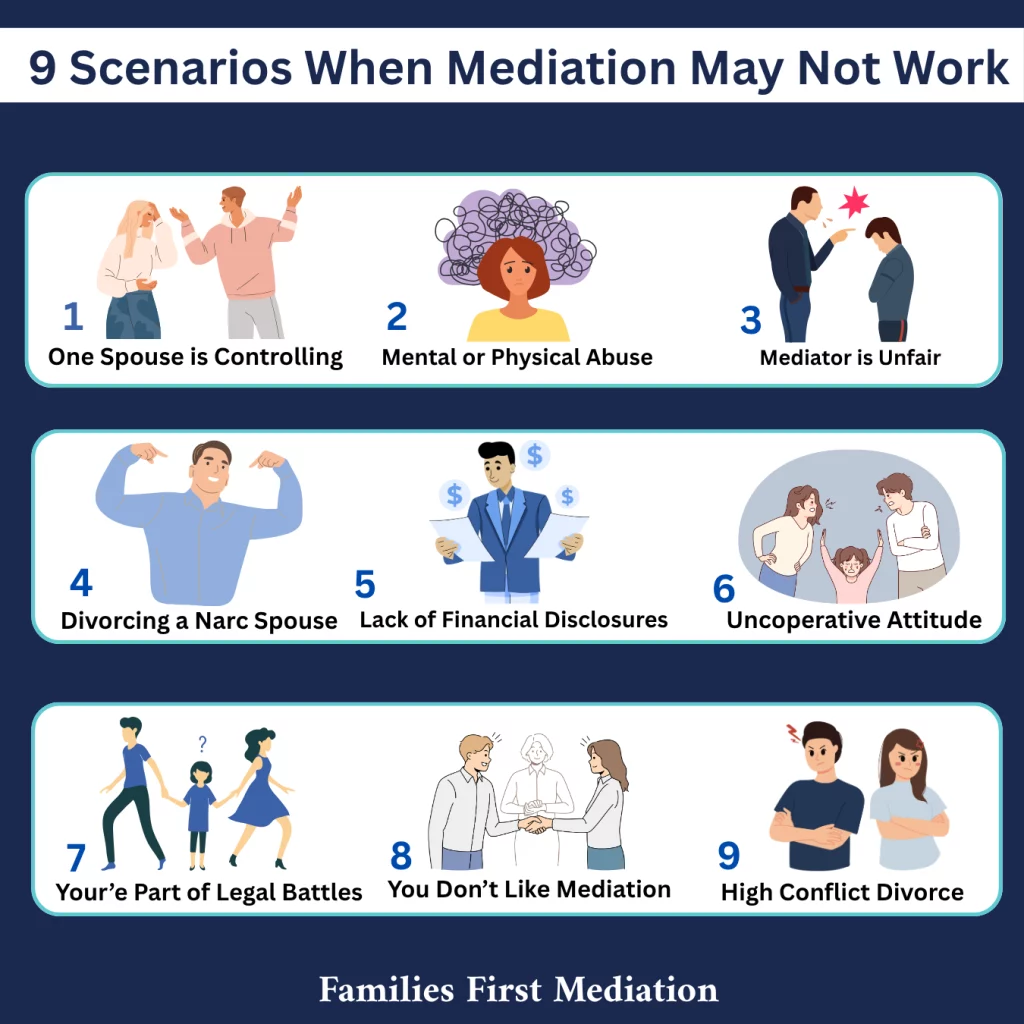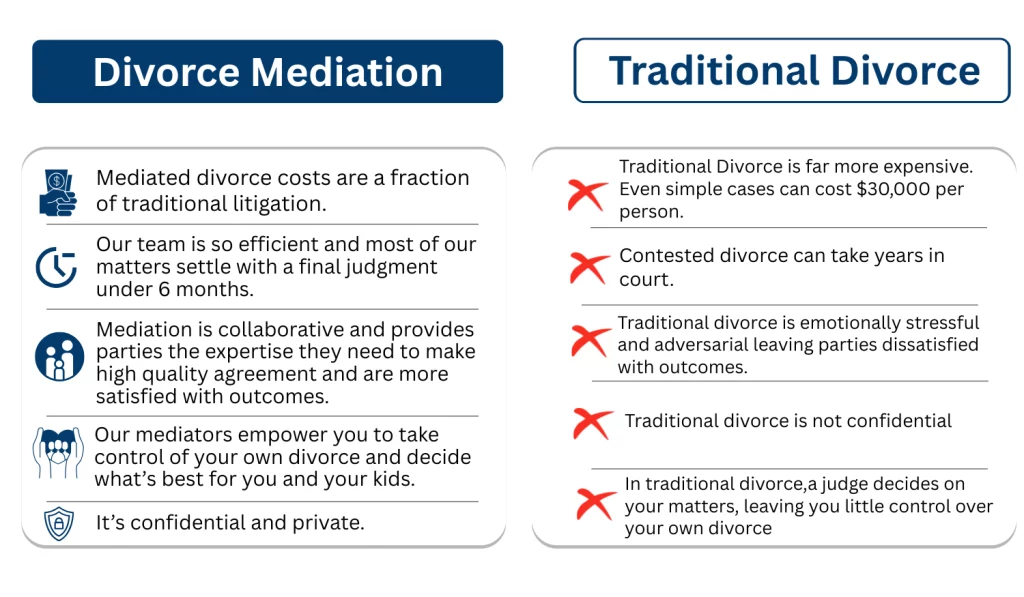Providing Divorce Mediation Services Throughout California
Providing Divorce Mediation Services Throughout California
Home » Divorce and Family law Blog » When Is Divorce Mediation Highly Not Recommended?

Divorce mediation in California proves creepier and worse in some cases. This peaceful, emotionally healthy, in-expensive approach sometimes fails.
Rebeca and John– not their real names – enter divorce mediation with an aim to reach a quality agreement. But soon in the 3rd session of mediation Rebecca finds that his spouse is lying and manipulating.
She feels that as if mediation is about his spouse’s interests. Communication breakdowns, verbal arguments and coercive behavior of his manipulating husband make her feel low before the mediator and she finally decides to go to trial.
If your case is like Rebecca, stop here. In other words, if you think that your soon to be ex-spouse is a narcissist, involved in other legal battles, mediator is incompetent or your case has a history of domestic violence withdraw from mediation and consider other dispute resolution options.
In this guide, California based expert Mediator Dina Haddad throws light on some scenarios, which might not be best for divorce mediation. She also shares her insight on some other divorce options if you’re not going for mediation.
Talk to Dina Haddad and get a free case evaluation if mediation is fit to your case. Book a FREE Divorce Mediation Consultation today.
Divorce mediation is a non-adversarial process in which the divorce mediator – specially trained for this purpose – helps couples find solutions to issues such as asset and debt division, child and spousal support, and child custody without going to court.
Unlike divorce lawyers, who represent one party, a divorce mediator is more of a neutral party to both spouses and assists them in coming up with solutions that cater to every party’s interests.
Mediators are cooperative and solution-oriented, making the divorce process less expensive, less stressful, and more efficient than traditional litigation.While some special situations may require a divorce lawyer, mediation has proven to be the most optimal route, especially for couples that wish to avoid lengthy court battles. Though divorce mediation is easy, it requires complete preparation in terms of what financial and legal documents you would be needing, and what would happen in different phases of divorce mediation.Long story short, divorce mediation is for the following individuals, partners, and parents.
Learn More: What Happens in Divorce Mediation?
The following are the benefits of divorce mediation:
Related: Divorce Mediation Tips and Tricks
Divorce mediation can be a fantastic way to create grounds for an amicable divorce. However, it is still vital to recognize when you are in a situation where mediation might not be the best route.
Take these scenarios as an example to help you determine if mediation is right for your case or other options would be more relevant to your needs and case.

When one party is often in control and the other is being controlled it can quickly turn toxic in mediation since your partner (if you are on the receiving end of the imbalance) is used to calling the shots.
According to a piece done by ADR Times; “in simple terms, a power imbalance results when the parties don’t share the decision-making and other aspects of the relationship equally.”
In short, a controlling spouse can attempt to bulldoze over not just you, but also the mediator.
Divorce mediation is not for a situation if your case involves either physical or mental abuse.
Negotiations in these kinds of circumstances very rarely ever go well because of the fear and intimidation that grow from the trauma of abuse.
Rather there can be safety concerns when putting you and your spouse together in one room.
The receiver of abuse might be coerced into compromising since in most situations – even the presence of their abuser can send them into fight or flight (whether they know it or not).
If your mediator is not competent or fair, it’s unlikely that you will reach a fair resolution and quality agreement tailored to your goals. A biased attorney-mediator can be a serious trouble to the entire divorce mediation process.
For example, if your mediator does not reply to your emails, questions on time and/or unnecessarily favors your soon to be ex-spouse, mediating a divorce can be a red flag and in the words of expert mediation lawyer (James L Arrasmith) you can do these things:
If you find that mediator behavior is not changing (even after talking to them), withdraw from mediation and proceed to the court since mediation is a voluntary process to reach a fair resolution.
Divorce is already tough but navigating it with a narcissist spouse could make it more chaotic and difficult. Don’t you remember the old saying that ‘the only thing harder than living with a narcissist is separating from them?’ Sitting with a narcissist spouse face to face in a mediation session is very challenging. Your narcissist spouse can use deceitful tricks to manipulate you.
If your spouse is diagnosed with NPD (narcissistic personality disorder) and they are manipulative too, check from the other divorcing options mentioned below.
Related: Preparing for Child Custody Mediation with a Narcissist
Lack of financial disclosure in mediation could lead to unnecessary delays and litigation/ court path. If you think that your spouse would be hiding information, then reaching a fair division of assets and liabilities would be unlikely.
Open and complete financial disclosure in mediation is a key to fairness, which if compromised by one or both spouses could affect the integrity of the entire mediation process. In case of intentional, inadvertent or financial deceit, other parties could petition the court to reopen the case.
For a mediation to work, it is a must for both the spouses to be cooperative on important divorce matters (custody and visitation, alimony, etc.) and engage in amicable communication in good faith to find common grounds, leading to fair and quality agreements.
Though you may see red flags in mediation but if you skip it without making efforts to make it successful can be very costly as well. If you go for emotionally taxing litigation it could be more time taking and bringing more financial strain on both of you.
Therefore, if you find your spouse uncooperative, find why they’re acting like this and educate him about the consequences of failing the mediation process leading to expensive litigation.
Mediation might not be best when your spouse is going through other legal battles, such as a criminal matter.
It can cause a lack of transparency, resulting in suspicion that your spouse (or yourself) isn’t being entirely honest about their assets.
When it comes to divorce, honesty is the best policy you both spouses can follow as hiding important information could lead to court penalties and legal consequences.12
Divorce mediation is all about cooperation and negotiation to resolve your disagreement in divorce. A highly conflicted marital relationship typically involves intense emotional reactions, communication breakdowns and verbal abuse, which is unlikely to work in mediation.
Divorce mediation and high conflict marital relationships seem like the opposite ends. According to Kathy J. Marshack, couples in a high conflict divorce are unlikely to engage themselves in business like manners or in a friendlier way, which can mediation misfit to your case.
Unfortunately, you cannot force your partner to mediate. If your spouse shies away from divorce mediation, you need to consider something else to find out the solution because mediation is all about you two.
If you and your spouse have any concern or confusion about mediation, book a FREE Divorce Mediation Consultation with California’s Top mediator and Super Lawyer Dina Haddad to find out the best option for your case.
Litigation in divorce is the best option to consider for couples if their cases involve high conflict, domestic violence, non-participation of matters of urgency or safety. It’s very costly and takes a long time. It also has limited follow through given the judge imposes the order, and it is not agreed to by the parties.
Collaborative divorce allows couples to work together with their lawyers to work out the terms of their divorce. The attorneys and other professionals use a team approach to assist the couple in this process.
It’s best for people on okay terms and agree to settle disagreements outside of court. However, it can be more expensive than mediation and cost as much as a litigated divorce.
If a collaborative divorce doesn’t work out, the parties cannot use their attorneys to litigate, which can be very costly. For a collaborative divorce to work, spouses must be on good terms.
In arbitration, an arbitrator gathers evidence from the two of you and, based on that, makes a ruling on who ‘wins’ or ‘loses’.
It is similar to a trial but not quite. It is far less formal, and the arbitrator can impose rules on the couple and penalize them if those rules are broken. It’s best if you want a final (and binding) decision when finalizing your divorce. Its disadvantage is that it is similar to litigation and takes your divorce out of your hands.

Divorce mediation in California can be one of the best options for an amicable and peaceful dissolution. But (as we have discussed), you should always prepare yourself and ensure this is what will be best for you and your partner.
Mediation has many perks and can give you an advantage over disagreements, but it is only suitable if you both spouses agree on all major issues and are willing to cooperate to reach quality agreements.
Skip adversarial court battles and expensive attorneys by mediating your divorce with Families First Mediation. Create a personalized and quality agreement with Dina Haddad. Book your FREE Divorce Mediation Consult today.
Related: Divorce Mediation Checklist
Families First Mediation is a family law mediation firm in California with over 60 years of combined family law experience. Our expert family law mediators are committed to providing you with a healthy divorce and creative family law solutions outside the court without the pricey attorneys and stress.
If you’re navigating divorce in California, take advantage of our vast expertise and background in the field of family law from divorce, custody, child support and spousal support to child support modification and legal separation. Book a Free Divorce Consultation with us.
Cases involving abuse, power imbalances, or other complicated legal issues. There are reasons that these factors don’t make a suitable environment for mediation.
In these situations, consider whether having an attorney consult with you while you are mediating is enough for you to receive the mediation benefits without you being harmed.
A lawyer can help you better understand not just your rights but your partner’s rights to prevent further trouble.
They can also represent you in court (if you aren’t doing a DIY divorce, you won’t need to go to court to begin with). But you do not need one, no.
They are not necessary during mediation sessions.
Divorce mediation is recommended in most cases. It can help you communicate one-on-one with your spouse, lay out what you want out of the divorce, and hear what your partner wants out of the divorce.
Mediation sessions focus more on issues like property division, coming up with plans for child custody and visitation, child support, and alimony.